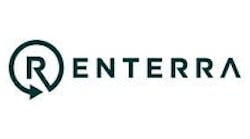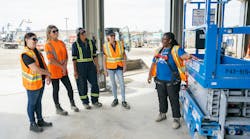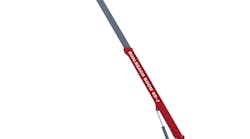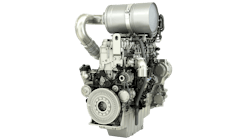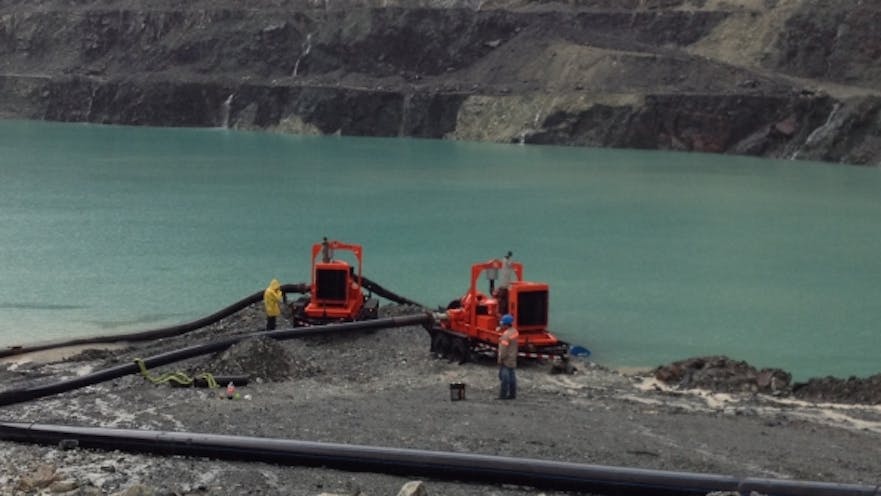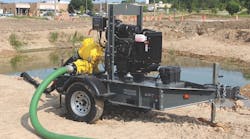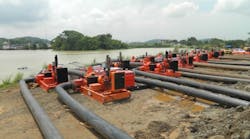Water always has to be moved and for that reason, the pump rental space is vibrant and growing. United Rentals wouldn’t have spent close to $800 million to acquire National Pump & Compressor if it didn’t think so. It is not a coincidence that the three biggest rental companies in North America – United Rentals, Sunbelt Rentals and Herc Rentals -- have pump rental specialty divisions.
Pump rental is not just a commodity that you can order up online, although pumping contractors might order particular machines at times. It takes expertise and knowledge. The major players have engineers to design jobs. Major pump manufacturers Xylem and Thompson Pump are also national and international pump rental players that employ engineers and design dewatering solutions as large as moving 1.7 billion gallons of water to fill the third set of basin locks on the Pacific Ocean sector of the Panama Canal as Xylem did last year. Their services are more in the realm of providing complex dewatering solutions that go far beyond the transactional nature of a typical equipment rental.
Sunbelt Rentals and other national players also have highly specialized staff.
“Since many pumping projects present their own unique set of challenges, experience is a crucial factor to effectively designing and implementing complex pumping systems,” says Ladd Gould, national strategic accounts manager, Sunbelt Rentals. “The Pump & Power Services division of Sunbelt has been in existence since 1997. Our team members are highly tenured; some having been with Sunbelt for more than 20 years. In addition to our team’s experience, our engineering support offers certified pumping designs. Many of Sunbelt's customers are on self-performing pumping projects, so they determine what pump solution best suits the application. However, many choose to have Sunbelt’s experts determine the solution. With this approach, we will complete site visits and then perform engineering calculations to determine the right configuration of our pumping equipment.”
There are thousands of ways and reasons water has to be moved from one area to another. Pump rental encompasses a wide range of possibilities, such as municipal sewer bypass work, dewatering in mines, and the more dramatic job of dewatering cities and towns after massive flooding caused by exceptional weather events. Oil and gas was a strong segment that has obviously slowed in the past couple of years.
And the largest segment, when the economy is strong, is construction job sites where the earth has to be excavated. When water is found below, the site has to be dewatered before construction can take place. And when earth needs to be cut into to lay pipe, water is often there beneath the surface and pumps are required.
Ultimately nothing is better for the pump rental and dewatering business than a strong economy.
“Right now we’re busy for all the right reasons,” says Mike Grant, portable products and rental market manager, Tsurumi Pump. “A lot of people tend to correlate a busy pump business with a lot of rain and certainly that helps our business, and we certainly want to be there to supply our customers so they can service their customers. But what we’re really looking for is a strong economy, steady growth and a good outlook, which we’ve had this year. A lot of housing starts, construction, digging, hitting water, and needing to dewater. Road work contractors are busy, there is a lot more infrastructure work; we’re very pleasantly surprised.”
“The construction trends that we see are strong,” adds Dave Flinton, Xylem's senior vice president & president of dewatering. “New construction is up, up the last couple of months and when we talk to some of our customers in places like the mid-Atlantic region, some of the construction firms have got backlogs stretching out several years. So right now that is a very healthy market for us as well as public utilities. There is a lot of municipal infrastructure spending going on right now, as we come out of the challenges of 2008 and 2009 after the crash. Municipal tax revenues are healthier, so they are starting to spend on projects. So we are seeing really good strength in the public utilities business here in the United States as well.”
One of the primary reasons the pump rental industry has evolved is the capability of pump rental specialists and national rental companies.
“When I started in this industry more than 47 years ago, unless you were seeking a small diaphragm pump or small, wet-prime trash pump, you had to look long and hard to find a solution to a water problem when installing a pipeline, pouring a culvert, dewatering a deep open-pit mine site, by-passing a broken sewer line or emptying a caustic effluent tank,” says Bill Thompson, chairman, Thompson Pump, which manufactures and rents a wide range of pumps. “Exotic metals, sound-attenuation, fuel efficiency, electric motor-driven portable pumps with VFD’s, Tier 4 Final engines with DPF and SCR, remote monitoring, computerized diagnostics, GPS - these were not even in the vocabulary of the customer nor of the rental companies. Deliver it tomorrow? Not an option. Someone to visit the site, estimate the job, solve a problem, fix or replace a failed pump? I don’t think so.”
Now all those types of services and many more are offered anywhere in North America and much of the world with such companies as Xylem now with 21 branches in Latin America and now also offering its service in the Middle East with a new facility in Dubai, United Arab Emirates.
Thompson and Xylem, like the leading national rental companies, place an emphasis on supplying a complete dewatering solution not just thinking in terms of transacting an equipment rental. “Branches and hubs like that in the Middle East and Latin America also give us the opportunity to take a well-established, mature, complete dewatering solution offering and business model that we have in the States and export that to the hubs and branches that we are opening in Latin America and Dubai,” says Flinton. “That is our long-term strategy, it doesn’t just happen overnight going from no branches to all of a sudden having branches that can design, engineer and install and decommission complete dewatering solutions. That is our strategy to do that and we have a tremendous knowledge and capability here in the States that we’re leveraging globally to do that.”
It’s not just an equipment rental; it’s a complete solution that involves engineering a job, installation of the project, often sending staff to work around the clock to monitor operations, and then the dismantling of the project when the job is done. “As we say in our company, ‘we’re not just renting a pump, we’re providing the customer with a dry ditch,’ ” says Thompson, although in many cases it’s far more than a dry ditch that the pump rental specialist provides.
“You’re solving problems for customers,” says Flinton. “You’re moving up the value chain from just providing a customer with a piece of equipment, moving from strictly transactional to moving into this problem-solving mode, which gives you a really special relationship with customers and a really strong bond with your customers, moving from transactional to helping solve a problem at their site.”
“To ensure that we do not overlook anything, our Applied Products Group utilizes comprehensive checklists based upon the type of project with which we are involved,” says Thompson. “We perform job walks on almost every single project before we will even attempt to determine what equipment our customer will require. We also synchronize our pumping plan with our customer’s overall project strategy. This approach maximizes everyone’s asset utilization and usually results in a more profitable job for our customer.”
Decaying infrastructure
Indeed pump rental specialists have improved their offerings over the years and there are no shortages of opportunities in a country with decaying infrastructure.
“Many municipalities are faced with aging infrastructure in need of repair in order to prevent future sink holes and mitigate impending sewer spills,” says Sunbelt’s Gould. “To help support the repair projects Sunbelt Rentals Pump & Powers Services designs and implements turnkey pumping solutions for the diversion of sanitary sewers. These pumping diversions are more commonly referred to as sewer bypasses. With a bypass in place, customers are provided with dry work environments to perform necessary repairs and maintenance. Due to the environmental sensitivity of these projects, many of Sunbelt’s customers prefer the sewer bypass be left to category experts. This approach reduces risk and frees-up additional resources for the project. In these applications, Sunbelt will perform the sewer bypass ‘turnkey’ which means, in addition to providing the rental pumps, Sunbelt will design, install and operate the bypass pumping system.”
Bypasses are a large source of work for pump rental companies.
“In the public utilities space there are a couple of types of projects,” says Xylem’s Flinton. “Bypass jobs typically come in two different ‘flavors’ if you will. One is the unplanned bypass, where you have a piece of infrastructure that breaks, and we very quickly need to fix that and so we will send engineers, we have a group of application engineers that are specialists at putting together and designing pumping systems, dewatering systems and we will send them on to the site and assess the situation with the customer and they will design a bypass solution and then go forward and implement it. That’s on the unplanned side. That takes a lot of effort, and resources because it is an emergency response type of activity.
“Then there are the planned bypasses, take for instance a lift station. A municipality is asking, maybe upgrading because the lift station is old, and they want to upgrade the pump, upgrade the pipes. You’ve got to put in a bypass solution to bypass that while they do the work. That’s more of a planned type of bypass, and so in that case we’re usually working with EPC firms, (engineering procurement and construction firms) that are doing that design work and it’s a little more bid and spec type work versus the unplanned emergency bypass work. But again we do bypasses in both flavors.”
Dewatering application often vary regionally according to the types of land and soil. “While wet construction sites may be more frequent in the Southeast, deep mines are more prevalent in the West and by-passing old sewer lines dominates in many mid-Atlantic areas,” says Thompson. “Our operational plan calls for us to have the right products and expertise to tackle the various projects most common in each of the various locations.”
National companies have staff in place to be aware of the needs in various regions, while local pumping specialists or general equipment rental companies with pump expertise typically have knowledge of local conditions.
For the national rental companies that look to supply equipment on a complete jobsite, pump rental is, in a sense, the ground floor of the project. Since pumping is typically done early on in a project, being on a construction early on brings opportunities to rent the whole range of equipment as relationships are built with the contractor running the job.
Getting into pump rental
To be successful in pump rental, a company must have what Xylem’s Flinton calls “a stack of hoses and pipes and fittings.” And, especially when companies are looking to provide a complete dewatering system, he points out, there are multiple opportunities to rent other types of equipment such as light towers for work at night, and generators as well.
A lot of pump rental is done by general rental companies, small or large, that carry a pump inventory as part of a general offering. There are a few basics that are necessary to have an adequate inventory.
“If I have a new store opening, I’m going to recommend a 2-inch trash pump, electric submersible and a half horsepower, a 2-inch dewatering, in either 2/3 or a 1-horsepower electric and a 2-inch centrifugal gas and a 3-inch gas trash pump,” says Tsurumi’s Grant. “That’s what they really need as a base to start with and they can determine from there what their market is.”
A company such as Tsurumi that markets to the rental industry provides support.
“We have sales reps, independent manufacturers’ reps, that travel the country and work with our stores and I myself do as well and we do training on the questions to ask the customer,” adds Grant. “We also have very detailed information online and in our brochures as far as what the pumps can do. It makes a difference if it’s clean water or dirty water, how far are you pumping it, how high are you pumping it, are you going to make a right hand turn after you go 50 feet up and then go another 1,000 feet? Are you going to couple that pump from 2 inch down to 1 inch, everything has an effect on what the performance of that pump will do. As a manufacturer you have your maximum flow rate and maximum head rate. There are factors on each job that make what comes out at the end of that hose a little different.”
Master of disaster
To a lot of people, pump rental conjures up images of massive rainstorms and catastrophic floods, but in reality that is a small portion of the pump rental business. As Grant says, far more important to the pump rental market is a healthy economy with a lot of construction business, and pump manufacturers and rental companies in a vibrant economy never need hurricanes or floods to prosper. That said, when dramatic weather events hit, pump rental providers and manufacturers typically are prepared to spring into action.
“Thompson Pump Company established an Emergency Response Team whose mission is to recognize potential disasters in advance, determine the best method of responding, prepare personnel, materials and logistical items, and, at the appropriate time, physically responding to mitigate the damages caused by an actual disaster,” says Thompson. “Be it a hurricane, earthquake, tornado, explosion, lightning strike, flood or power outage, the results are similar but the range, scope and duration will vary.
“When the disaster has occurred, it is too late to begin to prepare. Anticipation, training, coordination, communication, following a pre-determined plan, being able to mobilize quickly and to get the ‘stuff’ you need to the right place by the best method and to install and operate it competently is a complex formula.”
“In disaster situations, Sunbelt has a team of individuals that coordinate the logistics and the implementation of pumping systems based on whatever the customer requires,” adds Sunbelt Rentals’ Gould. “Many customers faced with disaster situations order pumps in one of two ways: they order the largest pump in our inventory or a large quantity of mid-size pumps (typically 4- to 6-inch Sunbelt Auto-Priming pumps). As an example, Sunbelt responded with over 132,000 GPM of pumping capacity to assist with the dewatering of subways and tunnels in New York City as a result of Hurricane Sandy.”
As Grant says, preparation is everything. “Part of our success is since the downturn we’ve kept our inventory level at a high level. A lot of our dealers weren’t able to continue stocking [large quantities of] product and were calling on manufacturers to do so and we’ve continued to do that. We warehouse all over the United States, whether it’s a Tsurumi-owned warehouse or a third-party warehouse or through our sales reps. We certainly work with our manufacturers’ reps out in the field and communicate with them about what our customers’ needs are. The situation in Iberia and Lafayette, Louisiana, that was 21 inches of rain in 24 hours. There was so much water. Nobody planned on that. With the weather forecasts now there’s a lot you can plan on but there are still some surprises. We just try to react as quickly as we can based on what our customers’ needs are. With Hurricane Matthew we worked with our sales reps, and they worked with our customers. And we had a truck down there to fill the needs. We’re really there to support our base.”
The pump rental space is likely to continue to grow, especially with a construction economy that, at least for the foreseeable future, appears solid. The expertise of pump rental experts will keep them looking for new opportunities and growing the size of the market.
